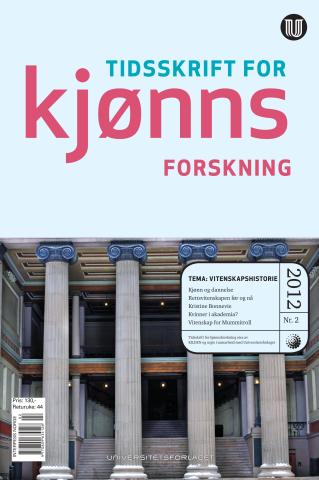History of science

Articles
Tone Brekke:
"So much better suited to small things": Niels Treschow on Bildung and gender
Niels Treschow, the first professor of philosophy at the University of Oslo, argued that women should be excluded from academia. In spite of this exclusion, however, Treschow formulates more nuanced models of gender that depart from this period’s dominant understanding of Bildung. Against academia as a homosocial and overly rational and professionalized sphere, Treschow suggests that both individual and societal Bildung should be based on sociability, the family, and feminine models of sympathy and care.
Keywords: Gender, bildung, philosophy, university, sociability, citizenshhip
Hilde Sandvik:
Forming the Sexual Contract: the Case of Law as University Discipline in Norway: 1811–1870
As legal experts at a new university (1811) in a new state (1814), Norwegian lawyers faced overwhelming responsibilities to both interpret existing law inherited from absolutism and to give advice about new legislation. The debates on matrimonial legislation show surprisingly radical attempts to better the position of women. However, no major changes took place and the article analyses the conservative arguments. One outcome seems to be that the interpretations of existing laws presented to law students in the 1850s and subsequently were even more conservative than they had been previously.
Keywords: Code civil, matrimonial legislation, legal majority, university history, law, reform
Anne Hellum:
Continuity and change in women’s law scholarship: Perspectives on women, gender and the law from above and below
This article seeks to describe and understand continuity and change in the conceptualization of women and discrimination against women in the discipline of women’s law at the University of Oslo since it was introduced in 1975 and up to the present date. A characteristic feature of the women’s law approach is the combination of a perspective from below that starts out with women’s lived realities and a perspective from above that focuses on the Convention on the Elimination of All Forms of Discrimination against Women (CEDAW). The article shows how women’s law research, through this approach, has moved from a position that emphasizes the similarities in the situation of women compared to men to a position that examines the similarities and differences between women. There has also been a move from an understanding of women as a uniform group to a compound and complex category. Continuity and change in the conception of women and discrimination against women is described through three controversies. The first is the debate about the relationship between women’s lived realities and gender neutral law. The second is the debate about what should be treated equally and what should be treated differently, not only between women and men, but also between women to achieve substantive equality. The third debate is about the complex legal situations that women’s mixed identities as individual rights holders and members of different ethnic and religious communities gives raise to, so-called intersectionality.
Keywords: Women’s law, international feminist legal studies, differences between women, women’s mixed identities, discrimination against women, gender discrimination, intersectional discrimination, the women’s convention (CEDAW).